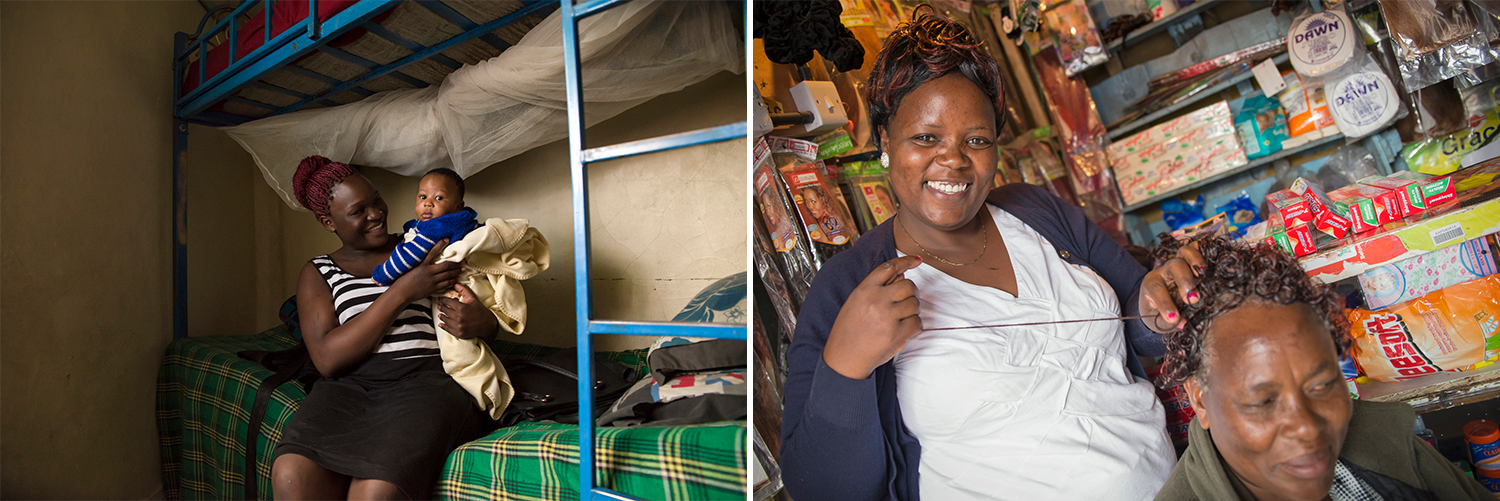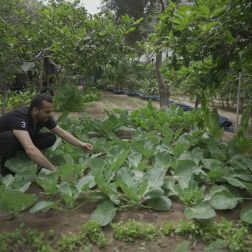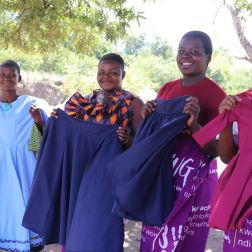- 4 mins read time
- Published: 22nd March 2018
The Oxfam training putting women on the right track
Knowledge is power – just ask these women from Nairobi. They are all members of the Oxfam project, Wezesha Jamii – Swahili for ‘empowering communities’ – which, among others, provides training, supports job opportunities and promotes equality.
The majority of these vulnerable women, who live in informal settlements across the Kenyan capital, are either domestic workers or small-scale traders. Before getting involved in the project, many of them knew nothing about their rights or entitlements – and were often exploited by their employers.

Left: Sheillah Achieng and her baby in their apartment in Mathare, Nairobi, Kenya. Photo: Katie G. Nelson/Oxfam Right: Doreen styles a woman's hair in her salon in Mukuru. Photo: Katie G. Nelson/Oxfam
Sheillah Achieng (28), who left school with few qualifications, says domestic work is the only job she can do. She describes how a former employer once threatened her with a knife when she asked for her wages. But since becoming a member of Wezesha Jamii, she understands that she can go somewhere for help.
“Now I am enlightened and if something similar happened,” says the mother of three. “I would go to the police station. I know there are some offices we can go to.”
The project also taught Sheillah about her rights around maternity leave. Before her youngest child was born, she asked her employer if she could have some time off. “They told me I could have three months… I understood that if you are pregnant you are due some leave. I didn’t know that before."
“I am very happy that I learned my rights about maternity leave. I didn’t know before that three months is my right. Normally you would get two weeks and then find someone in your job.”
The advice she’s received through Wezesha Jamii (WJ) has made Sheillah realise that she wants better treatment at work: “What I want is for more employers to treat us as human beings. I feel very bad to see employers not treating us well. “I feel more confident and I have more energy. I feel encouraged that I know my rights.”
Elsewhere, Doreen Muththoni has tried to make a go of various business ideas down through the years. But from selling bread, to cooking and selling goat meat, she has struggled to earn enough money. After becoming a member of Wezesha Jamii, she was trained in how to develop a good business idea, how to budget and how to manage her money.
Now running a thriving beauty and hair salon, Doreen says: “The project helped me choose the business I could do and one that could bring me more income than the meat business. What I do now is sell hair products and also do women’s hair.
“Through the training they showed me how to save, I didn’t save before… I can save more than 10,000 KSh through my business.”
These days Doreen has no problem paying school fees for her three children – not only that, she has opened savings accounts for them too.
“We enjoy many things now we don’t have so many problems,” she says. “We feel free and happy now. I am filled with joy. The things we are doing, WJ has been able to help me so much and now I know more than what I used to know.”




